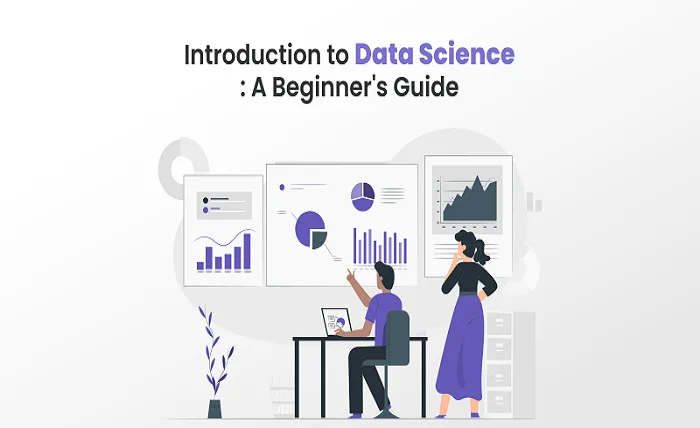Data science is a strong subject that uses data and statistical approaches to extract valuable insights, make educated decisions, and solve complicated issues. Data science has grown more significant in numerous businesses and sectors because of the exponential increase of data in today’s digital age.
Data Science Training provides beginners with a comprehensive understanding of the fundamental concepts, tools, and techniques used in data science. Through hands-on exercises and real-world examples, participants gain the skills needed to collect, clean, analyze, and visualize data, enabling them to embark on a successful career in this dynamic field.
This post will provide you with the necessary information to comprehend and explore the enormous world of data science, whether you are a student, a professional trying to transfer into data science, or simply intrigued about the field.
Exploring Data Science
Data Science Course Syllabus is a broad subject that integrates mathematical, statistical, computer science and domain expertise approaches to extract insights and knowledge from organized and unstructured data. It entails gathering, analyzing, interpreting, and visualizing data in order to identify patterns, trends, and correlations that may guide decision-making and produce commercial value.
Data science is centered on the process of translating raw data into usable insights. Data collection, data cleaning and preprocessing, exploratory data analysis (EDA), statistical modeling and machine learning, and data visualization and communication are all part of this process.
The first stage in data science is to acquire relevant data from diverse sources such as databases, APIs, web scraping, or sensor data. To allow analysis and exploration, the obtained data must be organized and stored in a systematic fashion.
Cleaning and preparing data are critical processes in data science. Errors, missing numbers, inconsistencies, and noise are common in raw data. To solve these difficulties, data scientists use methodologies to ensure that the data is accurate, full, and ready for analysis. This stage is critical for gaining trustworthy insights.
EDA is the process of analyzing and visualizing data to acquire a better understanding of its features, patterns, and distributions. EDA aids in the identification of outliers, correlations between variables, and potential discoveries. It plays a vital role in formulating hypotheses and guiding the subsequent modeling steps.
Data visualization and communication are critical components of data science. Data visualization using charts, graphs, and interactive dashboards improves the interpretation and transmission of data insights. Effective data visualization enables stakeholders to easily comprehend complicated patterns and supports data-driven decision-making. You can elevate your skills in data visualization with AlmaBetter’s online data science course in Mumbai and other regions.
Key Components
Data science comprises several key components that are integral to the process of extracting insights from data. These components include:
- Data Collection: Gathering relevant data from various sources such as databases, APIs, or sensors.
- Data Cleaning and Preprocessing: Addressing errors, missing values, inconsistencies, and noise in the data to ensure its accuracy and reliability.
- Exploratory Data Analysis (EDA): Analyzing and visualizing the data to uncover patterns, relationships, and potential insights.
- Statistical Modeling and Machine Learning: Applying statistical techniques and machine learning algorithms to build models that can make predictions and extract insights from the data.
- Data Visualization and Communication: Creating visual representations of data to facilitate understanding and communicate findings effectively to stakeholders.
- Deployment and Monitoring: Integrating data science solutions into real-world applications, monitoring their performance, and ensuring their accuracy over time.
- Ethics and Privacy: Adhering to ethical guidelines, ensuring privacy and data protection, and addressing potential biases or discriminatory outcomes.
Skills Required in Data Science
Data science is a multidisciplinary field that demands a diverse set of skills. Here are the key skills required to excel in data science:
Programming and Data Manipulation:
Proficiency in programming languages such as Python or R is essential for data scientists. These languages offer a rich ecosystem of libraries and tools for data manipulation, analysis, and machine learning. Strong programming skills enable data scientists to efficiently handle large datasets, write custom algorithms, and automate repetitive tasks.
Statistics and Mathematics:
A solid foundation in statistics and mathematics is crucial for data science. Understanding concepts like probability, hypothesis testing, regression analysis, and linear algebra helps data scientists apply appropriate techniques and interpret results accurately. Proficiency in statistical methods allows for robust modeling and effective data-driven decision-making.
Domain Knowledge:
Having domain-specific knowledge is invaluable in data science. It enables data scientists to ask relevant questions, identify meaningful patterns, and develop contextually appropriate models. Understanding the industry or problem domain enhances the value and impact of data science solutions by incorporating domain-specific considerations and constraints.
Data Visualization:
Data visualization skills are essential for effectively communicating insights derived from data. Tools such as matplotlib, ggplot, or Tableau enable data scientists to create compelling visual representations of data, making it easier for stakeholders to understand complex patterns and trends. Proficient data visualization skills facilitate storytelling and enhance the impact of data-driven narratives.
Machine Learning Algorithms:
Data scientists should be well-versed in a variety of machine learning algorithms such as regression, classification, clustering, and deep learning. Understanding the strengths, weaknesses, and underlying principles of different algorithms allows for the appropriate selection and application of models to solve specific problems. This skill helps data scientists build accurate predictive models and extract meaningful insights from data.
Communication and Collaboration:
Strong communication skills are crucial for data scientists. They need to effectively communicate complex findings and insights to both technical and non-technical audiences. Clear communication ensures that stakeholders understand the implications of the analysis and can make informed decisions. Collaboration and teamwork are also important, as data scientists often work in multidisciplinary teams, collaborating with domain experts, software engineers, and business stakeholders.
Watch this Data Science Course video to learn more about the field of Data Science.
Job Roles under Data Science
Data Scientist:
Data scientists are in charge of gathering, cleaning, and analyzing data in order to derive important insights. To tackle difficult business challenges, they create and implement machine learning models, conduct statistical analysis, and deliver data-driven suggestions. They are knowledgeable in programming, statistics, and machine learning methods.
Data Analyst:
Data analysts gather, organize, and evaluate data in order to detect trends, patterns, and correlations. They communicate findings and aid in decision-making processes by utilizing statistical approaches and data visualization technologies. Data analysts frequently collaborate closely with stakeholders to comprehend business requirements and generate actionable insights.
Machine Learning Engineer:
Machine learning engineers create, construct, and deploy machine learning models and algorithms. They focus on activities such as feature engineering, model training, and performance tuning, as well as optimizing algorithms for scalability and efficiency. Machine learning engineers work with data scientists and software developers to incorporate models into production systems.
Data Engineer:
Data engineers are in charge of creating and managing data infrastructure. They create data pipelines, build and optimize databases, and guarantee data storage and retrieval is efficient. To help data scientists and analysts, data engineers also work on data integration, data warehousing, and data governance.
Data Architect:
A data architect is someone who designs and implements data architecture solutions to help with data storage, integration, and retrieval. They develop data models, create data governance standards, and protect data. To assure the integrity and scalability of data systems, data architects collaborate closely with data engineers, database administrators, and other stakeholders.
Data Consultant:
Data consultants serve as external advisors, assisting organizations in using data to address business problems. They are knowledgeable in data strategy, data governance, and data-driven decision-making. Data consultants examine existing data systems, find areas for improvement, and make practical recommendations to customers.



